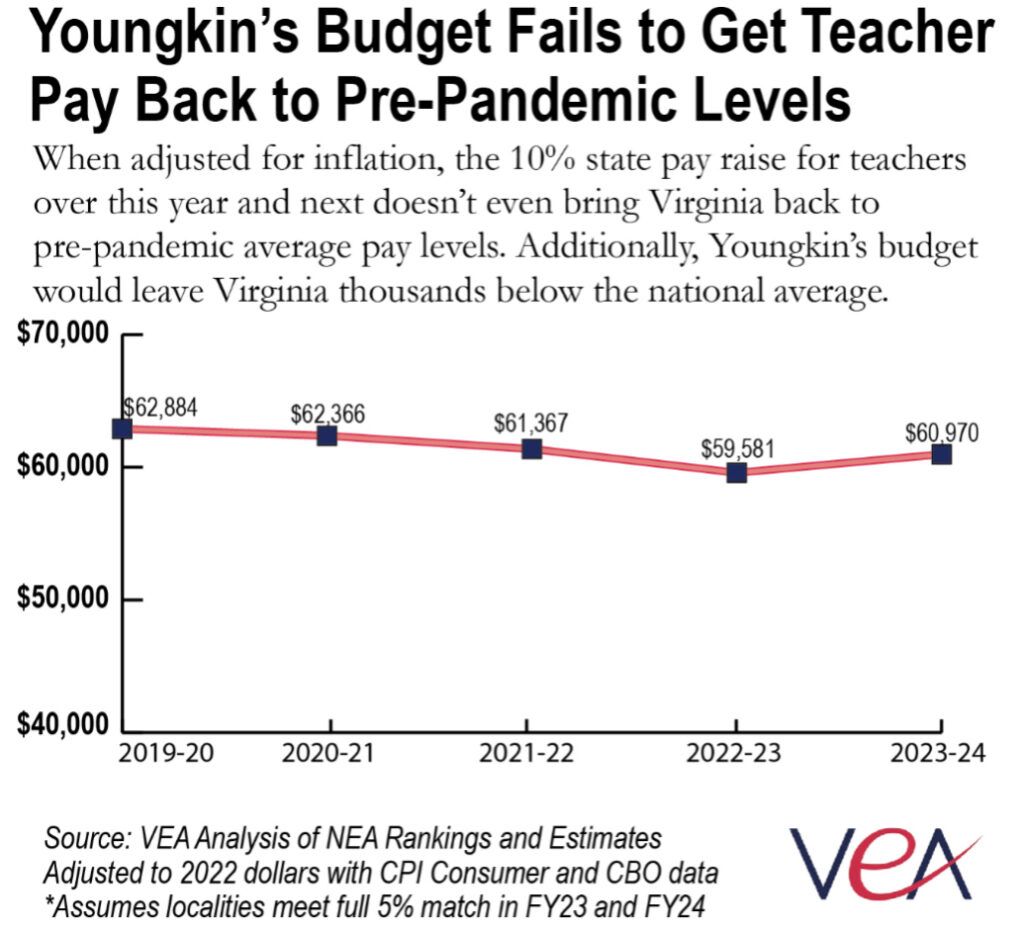New Report Confirms Virginia Falls Further Behind the Nation on Teacher Pay, Worsening Shortage Prospects
April 24, 2023
April 24, 2023
Since Governor Youngkin has entered office, Virginia average teacher pay has failed to keep pace with national growth and still has not recovered to inflation-adjusted pre-pandemic levels, according to the annual National Education Association (NEA) Rankings and Estimates report published today. Both Virginia and the federal government use this annual NEA report for their official estimates of state and national level average teacher pay. With a worsening teacher shortage both in Virginia and nationally, competitive pay has become more important than ever.
“Unfortunately, this report finds Virginia is falling further behind the national teacher pay average in the most recent year, with other states using their budget surpluses to go further,” said Dr. James J. Fedderman, President of the Virginia Education Association. “Virginia is estimated to have only increased its average teacher pay by 1.20% from the 2021-22 to 2022-23 school year. We can, and must, do better.”
The national increase over this time was more than double that, at 2.58%. Last year, Virginia’s average teacher pay was $61,367, $5,378 below the national average. This year, Virginia’s estimated average teacher pay is $62,104, $6,365 below the estimated national average. In addition, analysis by the Economic Policy Institute shows Virginia has the third least competitive teacher pay in the country when compared to other fields that require a similar level of education. Without sustained and substantially scaled investment in competitive teacher pay, Virginia is on a trajectory to have even more qualified educators leave the profession or state in the near future.
On addressing Virginia’s worsening school staffing shortage, the proposed state House and Senate budgets in February both provided an additional 2% pay increase for state supported school employees in the next school year, bringing the total increase to 7%. Should most divisions meet their local match obligations to get the full 7% increase next school year, Virginia would be on track to get close to the average teacher pay levels from the start of the 2020-21 school year (inflation-adjusted). Getting back to pre-pandemic levels of teacher pay should be the bare minimum goal given that teacher vacancy rates have soared, along with the number of not fully qualified and licensed teachers being used as stop-gap measures in our schools. The 7% proposed by the Senate and House still wouldn’t get Virginia to inflation-adjusted pre-pandemic levels of pay, and the 5% proposed by Governor Youngkin would leave the state even further behind.
It is a codified goal of the Commonwealth to compensate its public school teachers at a competitive rate in order to attract and retain highly-qualified teachers. Since 2017, “competitive” has been defined in Code as, “at a minimum, at or above the national average teacher salary.” The Youngkin administration, with $3.6 billion available, did not include an increase for educators in its proposed budget and is now losing ground on competitive pay, widening the gap by nearly $1,000 in its first year.
“It is imperative that lawmakers come to a compromise to finish the state budget,” said Fedderman. “And they must ensure that the final budget includes the state’s share of the full 7% increase that both the House and Senate agree is needed to prevent us from falling even further behind on competitive pay next year.”

According to a American Library Association survey, 67% of voters oppose banning books from school libraries?
Learn More